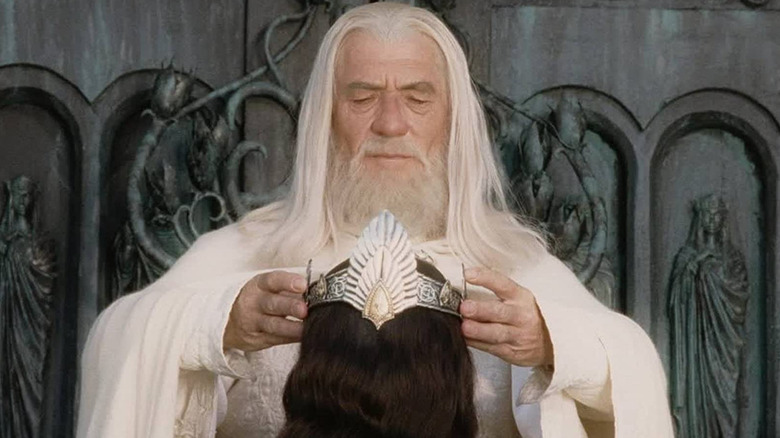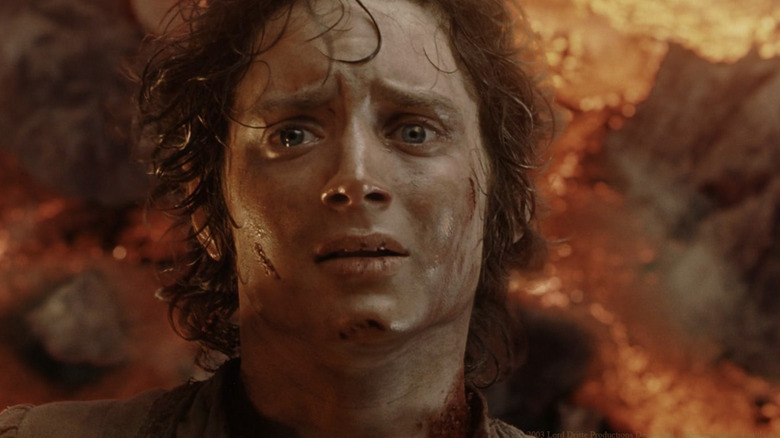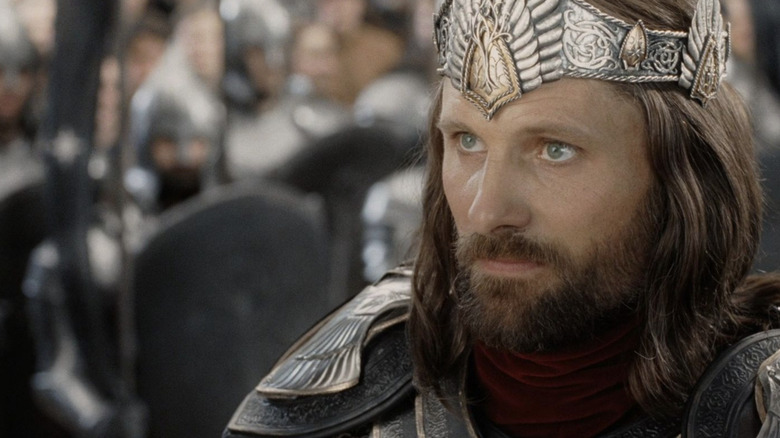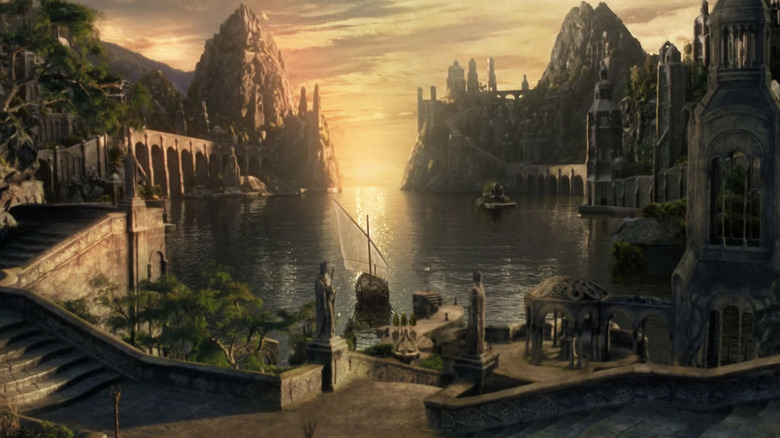The Lord Of The Rings: The Return Of The King Ending Explained: The End Of All Things
For the final film in his adaptation of J.R.R. Tolkien's "The Lord of the Ring" trilogy, Peter Jackson faced a seemingly insurmountable task: Getting the ending right. After all, as beloved as Jackson's film trilogy is today, when it first arrived it was buried under no shortage of scrutinizing criticism from Tolkien scholars and readers alike. As such "The Return of the King" needed to not only bring the trilogy's epic story to a close in a way that was true to its source material but also to Jackson's version of the tale.
Of course, Jackson's movies were never going to be a wholly faithful cinematic telling of Tolkien's novels — if such a thing could ever exist — and to assume otherwise would merely ensure one's inevitable disappointment. To his credit, Jackson actually squeezed quite a bit of Tolkien's books into his movies at a time when three-hour films were definitely not the norm. All the same, important characters were conflated or altogether omitted, as were entire sequences like, rather controversially, the Scouring of the Shire.
Even so, Jackson's films carried over plenty of thematic elements from Tolkien's books in truly satisfying and visually stunning ways. Nowhere else is that more true than in "The Return of the King," particularly the Extended Edition, which goes to great lengths to neatly tie up and fulfill the trilogy's various character threads and arcs via its ambitious multiple "endings." The journey that started in "The Fellowship of the Ring" is completed the moment Sauron's prize sinks into the molten lava of Mount Doom and the Dark Lord is defeated — but that's far from where the story ends in Jackson's film.
The Eagles are coming!
The first climax of "The Return of the King" comes with the destruction of the One Ring, sending Mount Doom into an apocalyptic eruption with Frodo and Sam marooned on its slopes. As the Ring's hold fades, Frodo is finally able to recall his memories of the Shire, while Sam struggles tearfully with the realization they really won't be returning home. As the cosmic forces of darkness crumble around them, the focus remains firmly on the tender intimacy between two friends trying to comfort one another in the face of unimaginable strife. "I am glad to be with you Samwise Gamgee," Frodo tells Sam. "Here at the end of all things."
Except it's not the end. Gandalf flies in on the Eagles of Manwë to rescue the two hobbits. Tolkien proclaimed this type of knick-of-time arrival a "eucatastrophe," and he uses it throughout "The Silmarillion" and "The Hobbit." To some, the Eagles might seem like a deus ex machina, but nothing about them ever feels unlikely or unearned. Other examples include the arrival of the Rohirrim and Army of the Dead at Pelennor Fields, as well as Gollum inadvertently preventing Frodo from failing his quest by taking Sauron's ring from him and falling into the Crack of Doom.
In the same way, Gandalf's arrival on the Eagles doesn't cheapen the despair of the previous scene or the hobbits' admirable rallying against it. Instead, it enriches the catharsis that comes with them being rescued. It's the arrival of a happy ending (sort of) deferred for far too long. But it also just doesn't serve the story to let Frodo and Sam simply die on Mount Doom, especially when one of the biggest thematic elements of Tolkien's work is how a person is ultimately changed by their journey.
My friends, you bow to no one
Tolkien actually disliked the title "The Return of the King" because he felt it gave too much of the plot away — though there's no denying how important that "return" is. It's through Aragorn's ascension to the throne that he repairs the line of Isildur and makes redemption for the men of Middle-earth possible. So, after an essential reunion of the Fellowship (a callback to Frodo's arrival in Rivendell), we finally get to see the king's return. But Aragorn's coronation is founded on more than just the right blood.
This is a man who chose exile out of fear of abusing his power, yet found his way back to it because of an altruistic desire to help his people. Unlike Denethor — whose mind is twisted by insecurities and fear — Aragorn trusts the counsel of others (especially Gandalf) thanks to his time in the Fellowship. He also doesn't value the survival of his House over that of other people in Middle-earth. This is why Aragorn is able to make the hard decision to march what's left of his forces to bait Sauron, in the hopes that it will give Frodo the opportunity he needs to destroy the One Ring.
Aragorn is the embodiment of Tolkien's idyllic vision of a noble leader, someone who can inspire but also govern justly by example. It's why he honors his oath to the Army of the Dead, forsaking the obvious military advantage. In the Extended Edition, we even get scenes of him healing both Faramir and Éowyn, which underscores both the literal and metaphorical ways in which Aragorn's return is remedial to the kingdom. Perhaps the greatest illustration of his worth is the moment he gets the entire kingdom to bow to the four hobbits.
Into the west
With the kingdoms of men set in order, the hobbits return home to the Shire, with Sam finally marrying Rosie and Frodo chronicling his adventure alongside Bilbo's. But unlike the others, Frodo cannot simply return to the life he left behind, which is why he decides to leave Middle-earth with Bilbo, Gandalf, and the other Elven ring-bearers, much to the heartbreak of his companions. "We set out to save the Shire, Sam, and it has been saved — but not for me," Frodo tells his dearest friend.
Even with the One Ring destroyed, something still eats at Frodo, with his physical wounds (like the Morgul blade stab courtesy of the Witch-King) becoming an extension of the mental and spiritual ones he's still afflicted by. Like the "shell shock" that participants in World War I suffered from, Frodo begins to understand that sometimes there is no going "there and back again." But it's also important to note that right before Gollum's intervention, Frodo had succumbed to the ring. Even with Sauron's weapon gone, its hold still lingers for those who once carried it — a point underscored by Bilbo's half-hearted request to see it one last time.
By accepting the offer to sail west into Valinor, Frodo hopes to alleviate both the shadow of the One Ring's power and the toll his quest took on his soul. When he walks onto the boat, turns back, and beams a joyous smile back at his sobbing friends, you know he's found some semblance of peace at last. Yet, even then, the story is not quite over! Of course, we need to see Sam come back home, for no story truly ends, just our varying parts in it.



